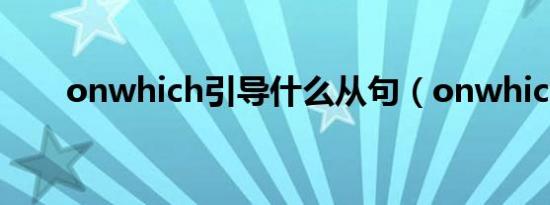
状语从句的简略节略是指派讲话的精粹将状语从句进行简化。需餍足两个前提: 1.主句和从句的主语同等,或从句主语为it;2. 从句重要动词是be的某种步地。
譬喻:
When ( the museum is ) completed , the museum will be open to the public next year .
He’ll go to the seaside for his holiday if (it is ) possible.
其余,比较状语从句频繁简略节略。
比方:
The higher the temperature (is), the greater the pressure (is ).
状语从句的"简化"形势常生计于以下五种状语从句中:
①由if, unless等开导的前提状语从句;
②由although, though, even if / though等启发的倒退腐败状语从句;
③由when, while, as, before, after, until / till等开导的时间状语从句;
④由as, as if等启发的体例状语从句;
⑤由as, than等向导的比较状语从句。接下来针对这五种情况作一演绎。
(1)当状语从句的主语是it,且谓语动词是be时,it和be要统统简化掉。
比方:
(2)当状语从句的主语和主句的主语相仿时,从句能够将主语和be动词简化掉。经常使用于以下几种情况:
a.连词+形容词
b.连词+名词
Although (he was) a farmer, now he is a famous director.即使他曾是个农人,而现在是位有名的导演了。
c.连词+此刻分词
Although (he is) doing his best in maths these days, he has still got no good marks.只管最近他一直在学数学,但他依然没有博得好成绩。
d.连词+过去分词
e.连词+不定式
f. 连词+介词短语
着重:当从句主语和主句主语不一致时,从句一些要么用万万式样,要么用自力主格机关来抒发。比如:
智能推荐
-

英语从句类型总结图(英语从句类型总结)2023-09-06 英语从句首要有三种类别,分别为定语从句(限定性定语从句、非限定性定语从句)、状语从句(退让、时间、所在、形式等状语从句)和名词性从句(主语从句等)
-

英语三大从句思维导图(英语三大从句)2023-08-19 英语三大从句:宾语从句(在句子中起宾语效用的从句)、定语从句(在复合句中润饰名词、代词的从句)、以及状语从句(在复合句中由从句示意的状语)
-

定语从句是什么意思(定语从句是什么?)2023-08-23 一、关联代词与关联副词1、关联代词在定语从句中,能作联系代词的有which、that、who/whom
-

状语从句英语(状语从句)2023-08-29 状语从句指句子用作状语时,起副词效用的句子,能够点缀谓语、非谓语动词、定语、状语或全数句子。可分为时间、位置、理由、条目、方针、后果、退让等从句
-

什么是状语从句英语(什么是状语从句)2023-08-30 状语从句是指句子用作状语时,起副词功用的句子,能够润饰藻饰谓语、非谓语动词、定语、状语或所有句子;能够分为时间、住址、来因、条目、方针、结尾、倒退腐败等从句
-

条件状语从句的时态问题(条件状语从句的时态)2023-08-26 大家好,小裕来为大家解答以上问题。条件状语从句的时态问题,条件状语从句的时态这个很多人还不清楚,现在一起跟着小编来瞧瞧吧
-

宾语从句例句100句(宾语从句例句)2023-08-28 宾语从句是名词性从句的一种。在主从复合句中充任宾语,位于及物动词、介词或复合谓语之后的从句称为宾语从句,例如Iknow(that)youhavemethim.1.
-

宾语从句课件ppt(宾语从句课件)2023-08-21 宾语从句是名词性从句的一种,用来冒充宾语的句子叫做宾语从句。如:Heaskedwhatyouweredoinglastnight.他问你昨日晚上在干什么
-

onwhich引导什么从句(onwhich)2023-08-31 大家好,小范来为大家解答以上的问题。onwhich引导什么从句,onwhich这个很多人还不知道,现在让我们一起来看看吧
-

高中英语三大从句专练100题(高中英语三大从句)2023-08-30 高中英语三大从句:宾语从句(在句子中起宾语效用的从句)、定语从句(在复合句中润饰藻饰名词、代词的从句),以及状语从句(在复合句中由从句示意的状语)
-

什么是表语从句举例(什么是表语从句)2023-09-12 大家好,小裕来为大家解答以上问题。什么是表语从句举例,什么是表语从句这个很多人还不清楚,现在一起跟着小编来瞧瞧吧
-

英语定语从句知识点总结(英语定语从句)2023-08-24 一、关连代词与关连副词1、关联代词在定语从句中,能作联系代词的有which、that、who/whom
